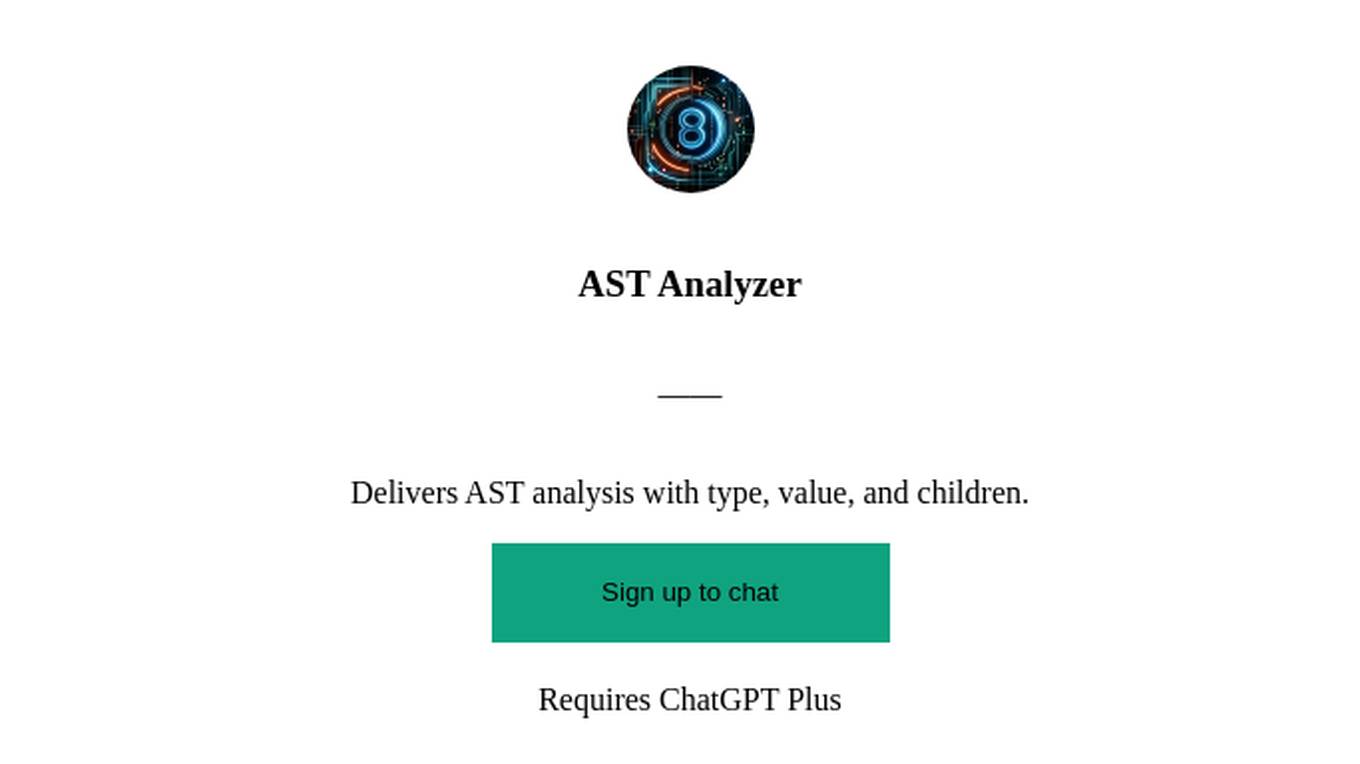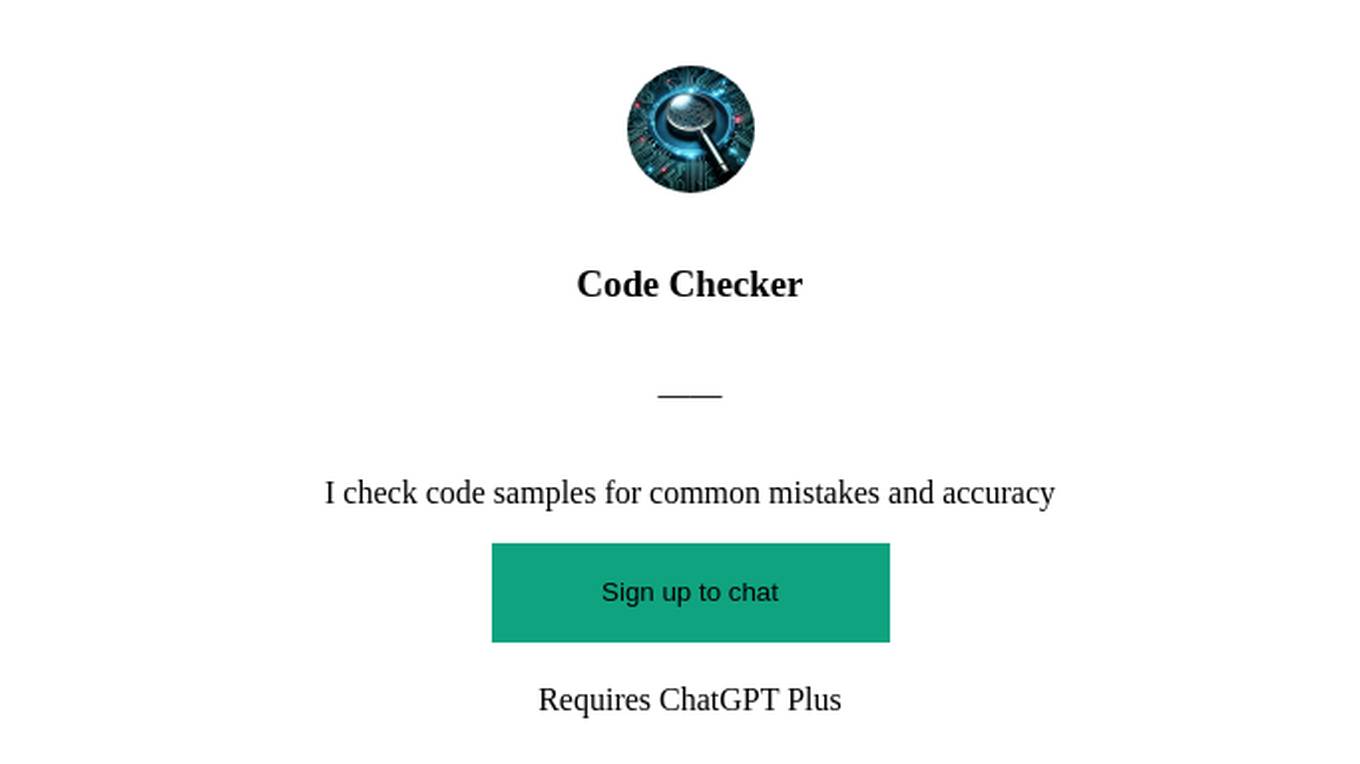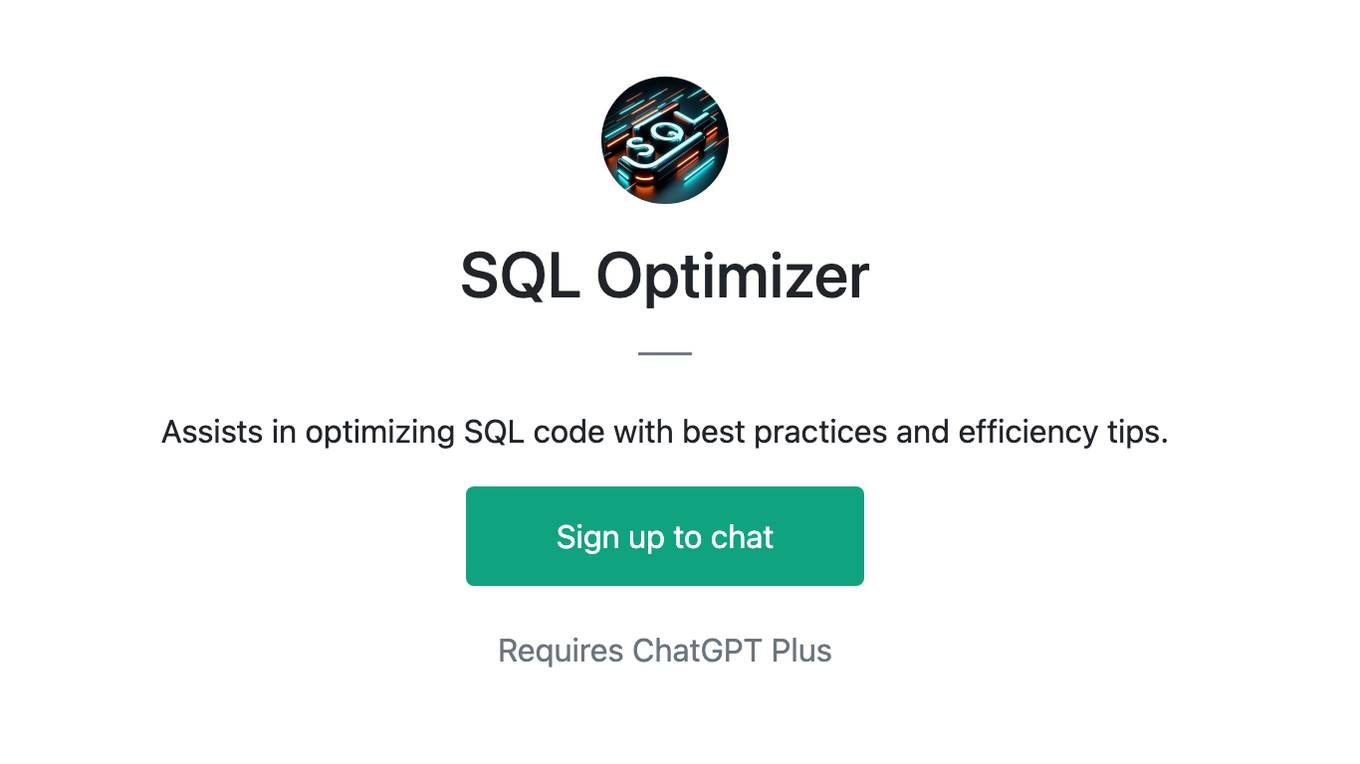Best AI tools for< Identify Code Patterns >
20 - AI tool Sites

Frugal
Frugal is an intelligent application cost engineering platform that optimizes code to reduce cloud costs automatically. It is the first AI-powered cost optimization platform built for engineers, empowering them to find and fix inefficiencies in code that drain cloud budgets. The platform aims to reinvent cost engineering by enabling developers to reduce application costs and improve cloud efficiency through automated identification and resolution of wasteful practices.
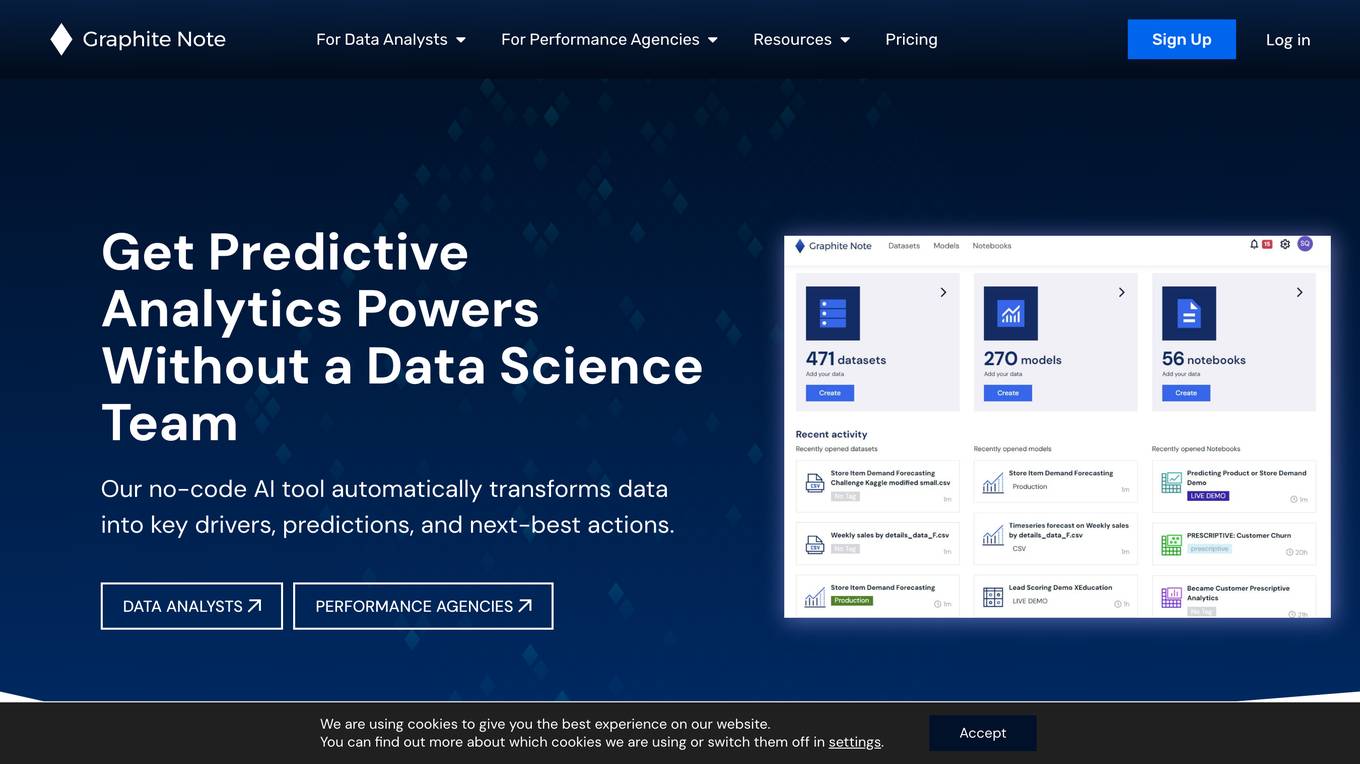
Graphite Note
Graphite Note is a no-code AI tool that helps businesses transform data into key drivers, predictions, and next-best actions. It is designed to be user-friendly and accessible to businesses of all sizes, even those without a data science team. With Graphite Note, businesses can quickly and easily generate AI models, understand patterns in their data, predict future outcomes, and get actionable insights. This can help businesses make better decisions, improve their operations, and grow their revenue.
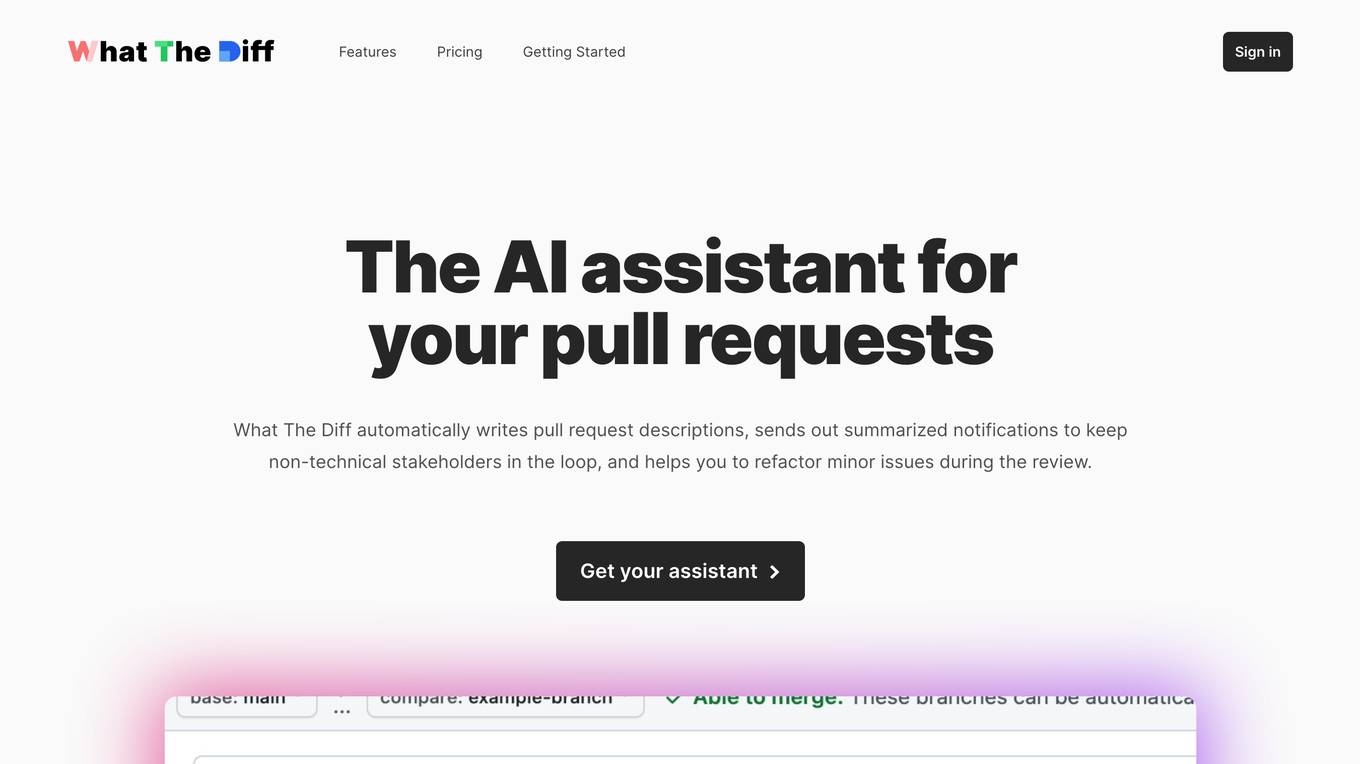
What The Diff
What The Diff is an AI-powered code review assistant that helps you to write pull request descriptions, send out summarized notifications, and refactor minor issues during the review. It uses natural language processing to understand the changes in your code and generate clear and concise descriptions. What The Diff also provides rich summary notifications that are easy for non-technical stakeholders to understand, and it can generate beautiful changelogs that you can share with your team or the public.
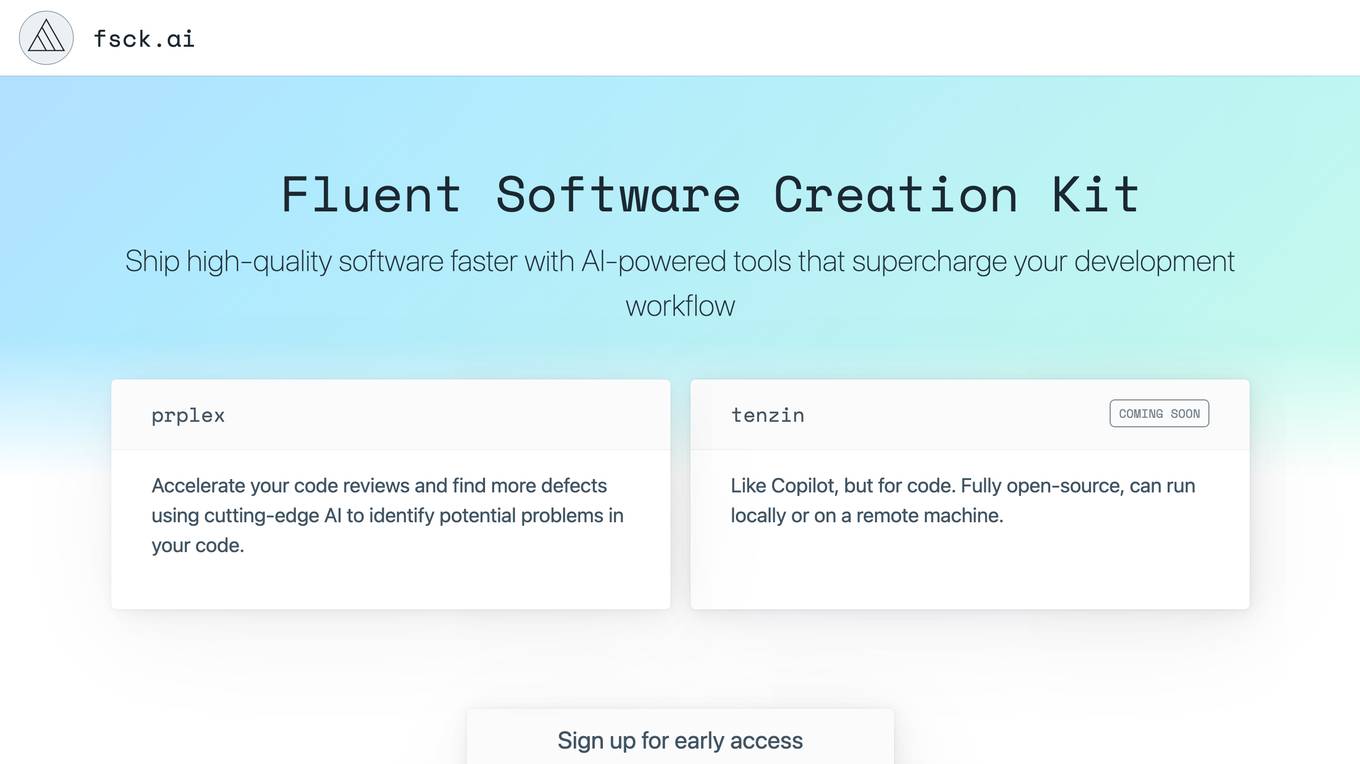
fsck.ai
fsck.ai is an AI-powered software creation kit designed to help developers ship high-quality software faster. It offers cutting-edge AI tools that accelerate code reviews and identify potential problems in code. Similar to Copilot, fsck.ai is fully open-source and can run locally or on a remote machine. Users can sign up for early access to leverage the power of AI in their development workflow.
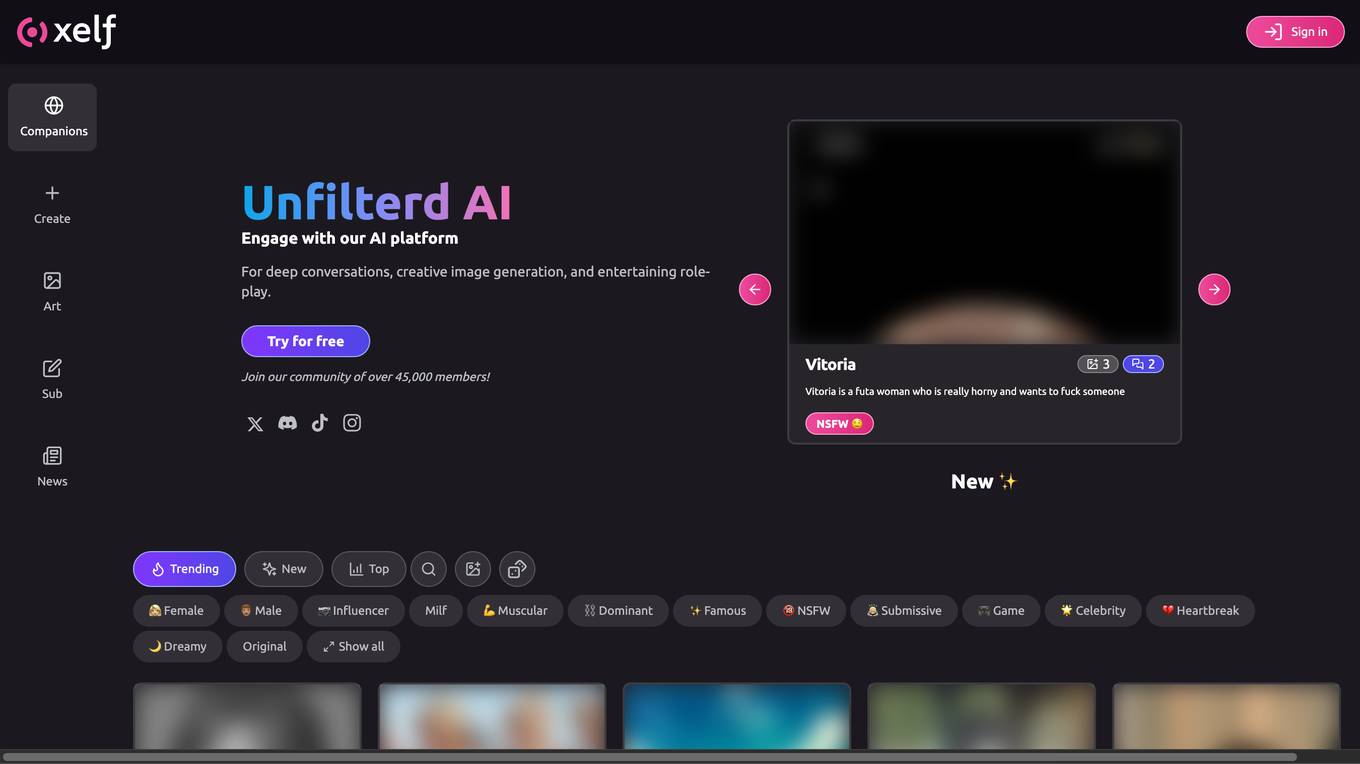
404 Error Page
The website displays a '404: NOT_FOUND' error message indicating that the deployment cannot be found. It provides a code (DEPLOYMENT_NOT_FOUND) and an ID (sin1::22md2-1720772812453-4893618e160a) for reference. Users are directed to check the documentation for further information and troubleshooting.
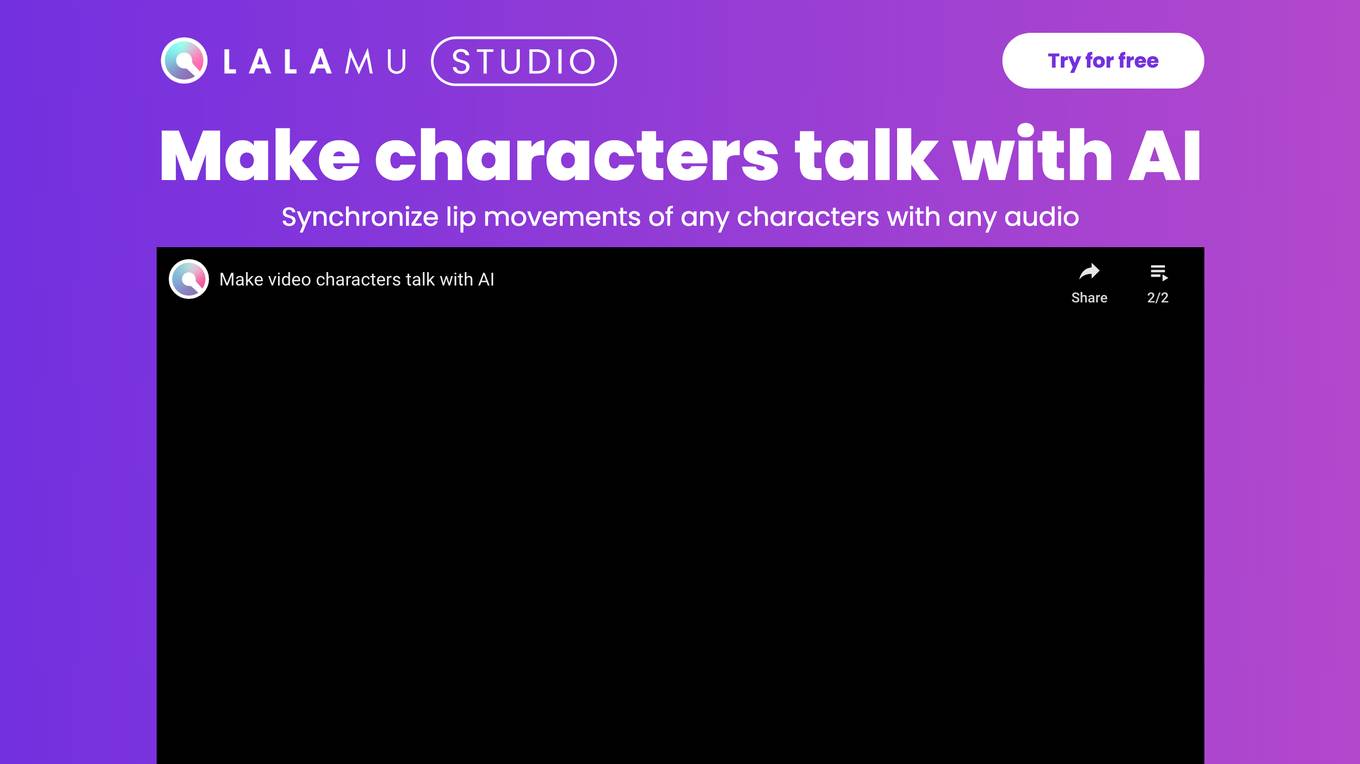
Error 404 Not Found
The website displays a '404: NOT_FOUND' error message indicating that the deployment cannot be found. It provides a code 'DEPLOYMENT_NOT_FOUND' and an ID 'sin1::t6mdp-1736442717535-3a5d4eeaf597'. Users are directed to refer to the documentation for further information and troubleshooting.
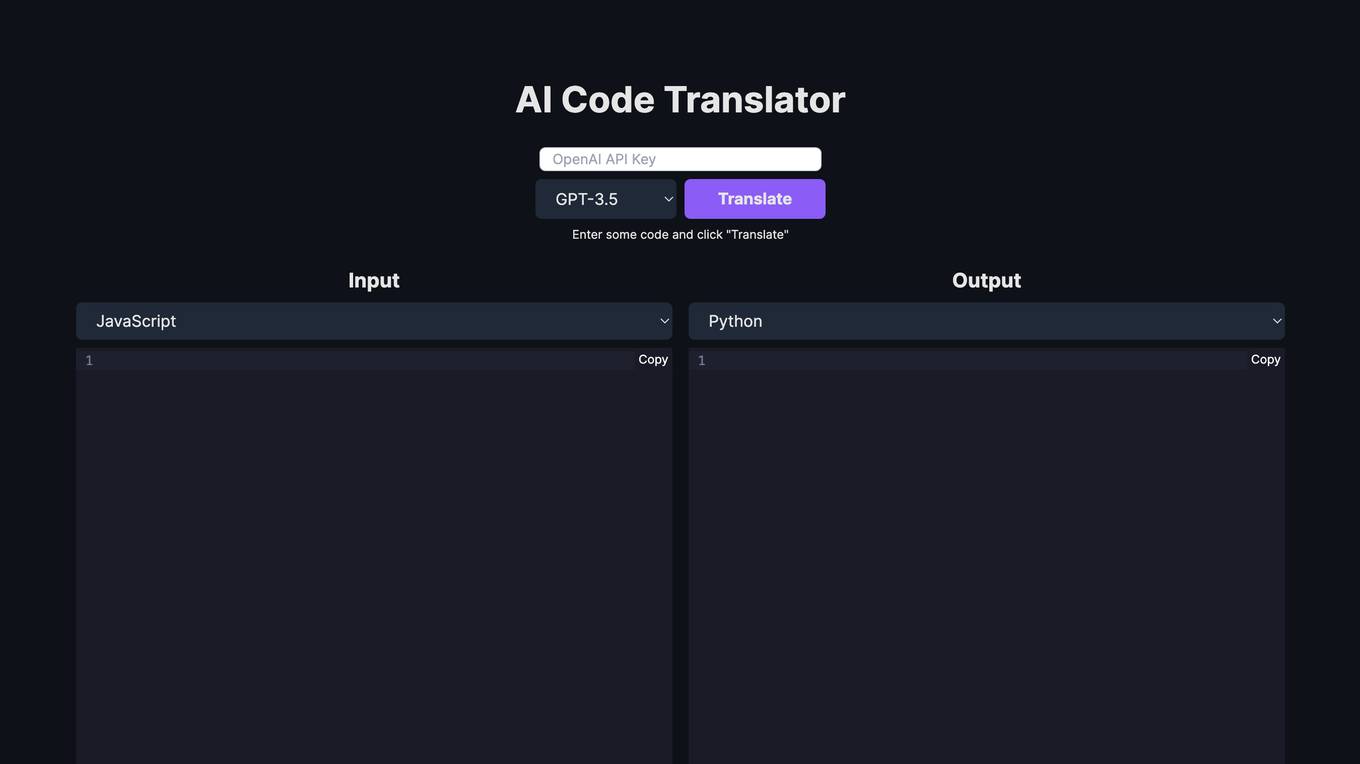
404 Error Page
The website displays a 404 error message indicating that the deployment cannot be found. It provides a code (DEPLOYMENT_NOT_FOUND) and an ID (sin1::rxfc2-1757785703946-87c02c710626) for reference. Users are directed to consult the documentation for further information and troubleshooting.

Faraday
Faraday is a no-code AI platform that helps businesses make better predictions about their customers. With Faraday, businesses can embed AI into their workflows throughout their stack to improve the performance of their favorite tools. Faraday offers a variety of features, including propensity modeling, persona creation, and churn prediction. These features can be used to improve marketing campaigns, customer service, and product development. Faraday is easy to use and requires no coding experience. It is also affordable and offers a free-forever plan.

Vilosia
Vilosia is an AI-powered platform that helps medium and large enterprises with internal development teams to visualize their software architecture, simplify migration, and improve system modularity. The platform uses Gen AI to automatically add event triggers to the codebase, enabling users to understand data flow, system dependencies, domain boundaries, and external APIs. Vilosia also offers AI workflow analysis to extract workflows from function call chains and identify database usage. Users can scan their codebase using CLI client & CI/CD integration and stay updated with new features through the newsletter.
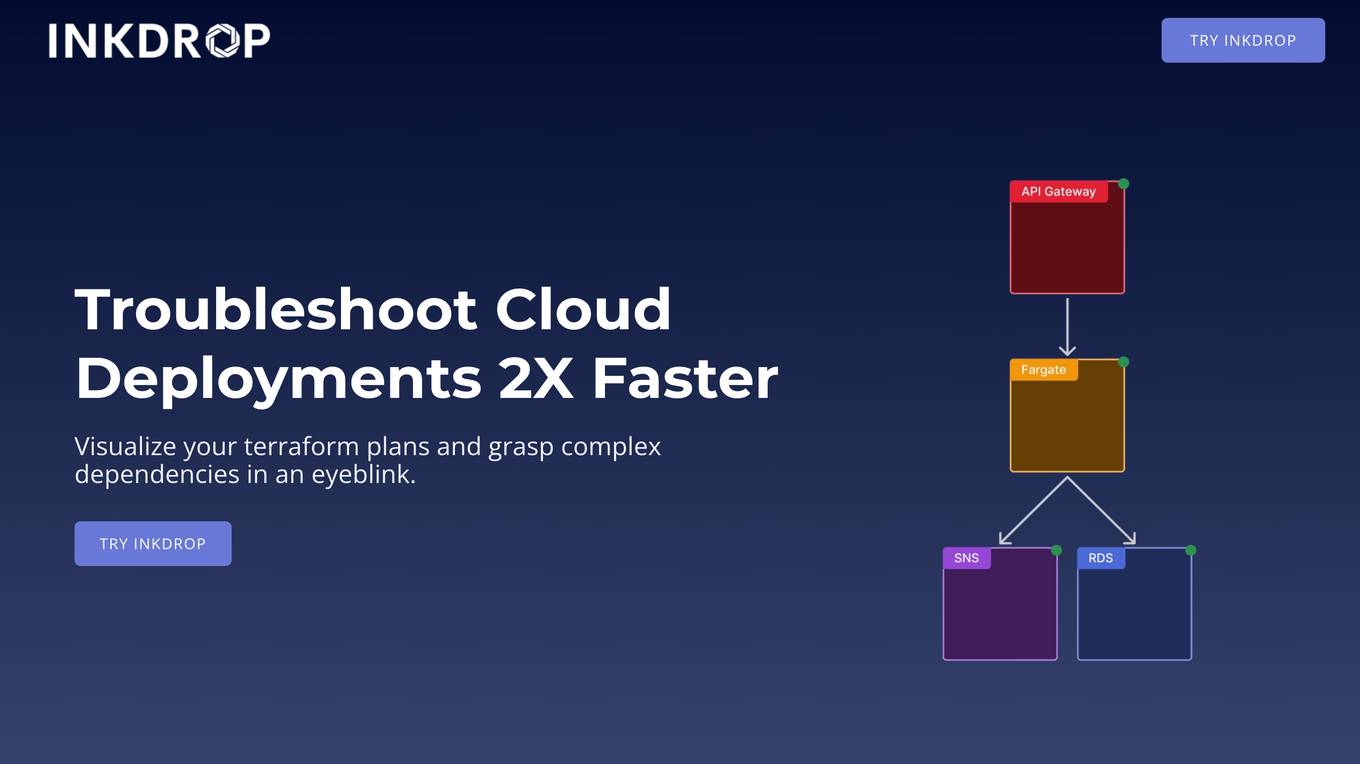
www.atom.com
The website www.atom.com provides a security service to protect against malicious bots. Users may encounter a verification page while the website confirms they are not bots. The service ensures performance and security by Cloudflare, requiring users to enable JavaScript and cookies to proceed.
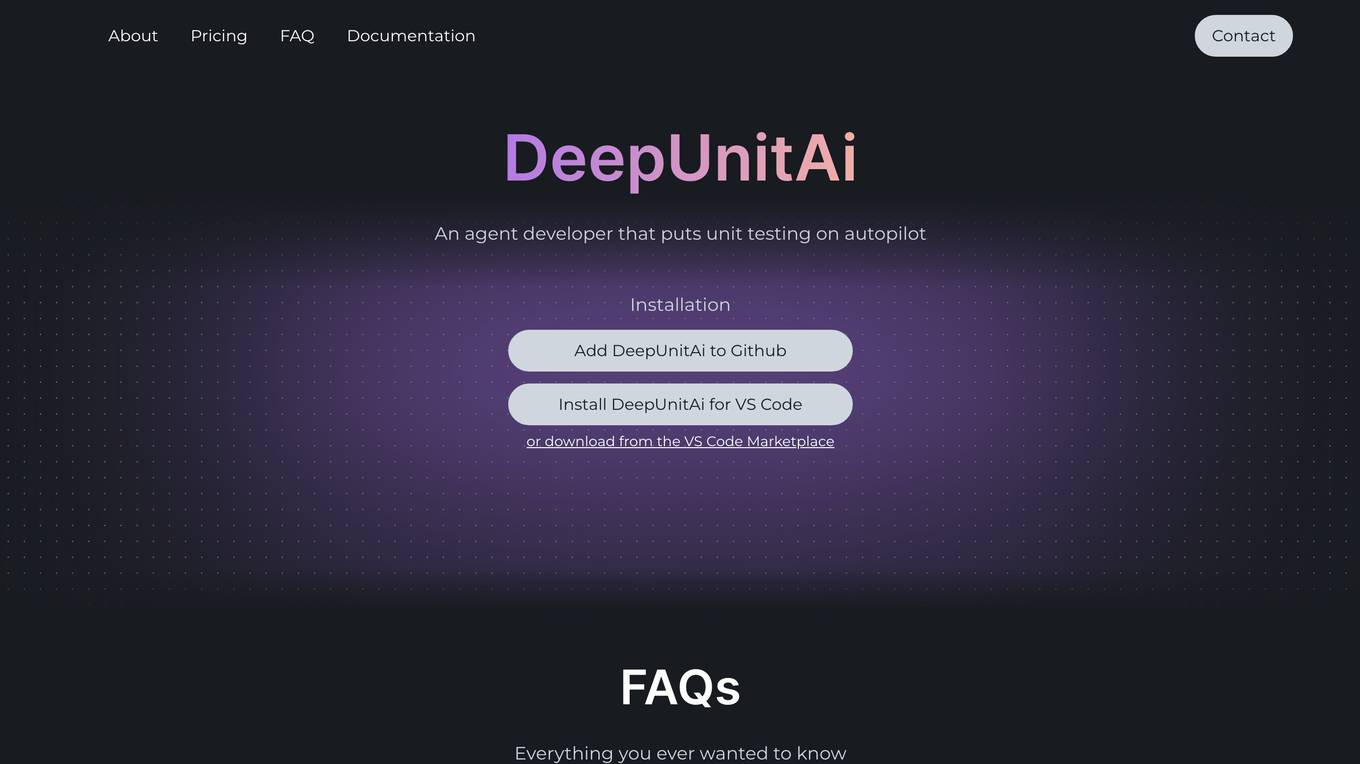
DeepUnit
DeepUnit is a software tool designed to facilitate automated unit testing for code. By using DeepUnit, developers can ensure the quality and reliability of their code by automatically running tests to identify bugs and errors. The tool is user-friendly and integrates seamlessly with popular development environments like NPM and VS Code.

Greptile
Greptile is an AI tool designed to assist developers in code review processes. It integrates with GitHub to review pull requests and identify bugs, antipatterns, and other issues in the codebase. By leveraging AI technology, Greptile aims to streamline the code review process and improve code quality.

cubic
cubic is an AI-native code-review platform that leverages artificial intelligence to conduct code reviews for complex codebases. It helps teams identify hard-to-find bugs in pull requests and the entire codebase, providing context-aware feedback and summaries to enhance the review process. cubic continuously scans codebases for bugs and vulnerabilities, triages issues, enforces coding standards, and learns from team feedback to improve over time. The platform offers features like automatic PR descriptions, one-click issue fixes, intelligent diff ordering, and visualizing high-level changes. With a focus on security and privacy, cubic ensures that code remains secure and private by not storing or training AI on the code. It supports various programming languages and offers different pricing plans tailored to different team sizes and needs.

Smaty.xyz
Smaty.xyz is a comprehensive platform that provides a suite of tools for code generation and security auditing. With Smaty.xyz, developers can quickly and easily generate high-quality code in multiple programming languages, ensuring consistency and reducing development time. Additionally, Smaty.xyz offers robust security auditing capabilities, enabling developers to identify and address vulnerabilities in their code, mitigating risks and enhancing the overall security of their applications.
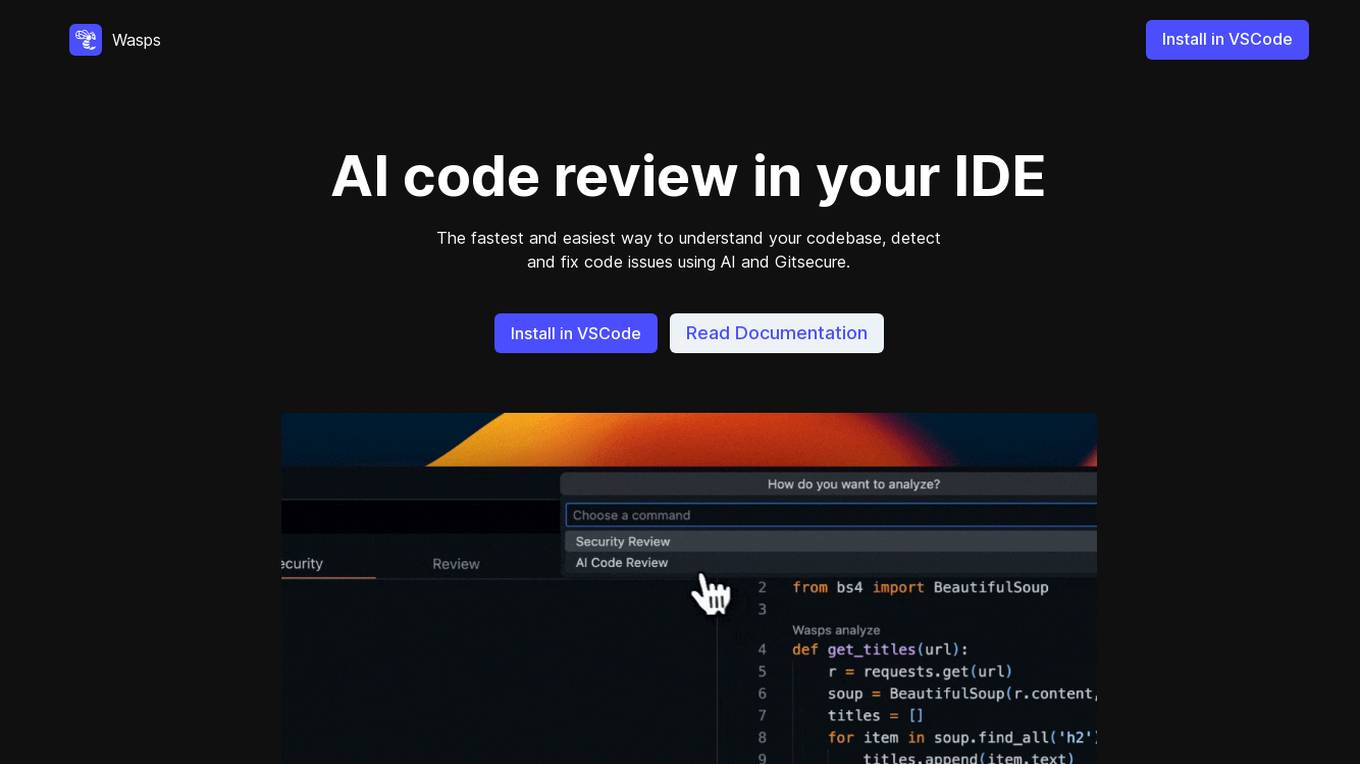
Wasps
Wasps is an AI code review tool that integrates seamlessly into VSCode, providing developers with a fast and efficient way to understand their codebase, detect and fix code issues using AI and Gitsecure. With Wasps, developers can identify and fix buggy & vulnerable code in minutes, receive clear and actionable feedback driven by deep analysis, and get recommendations for potential issues and improvements within their codebase. The tool allows developers to keep coding as usual while Wasps analyzes their code for them, making it easier to maintain code quality and keep bugs out of their code.

Wand
Wand is an AI-powered tool that helps you find and fix errors in your code. It uses machine learning to identify potential problems and provides suggestions for how to resolve them. Wand can be used with a variety of programming languages, including Python, Java, JavaScript, and C++.
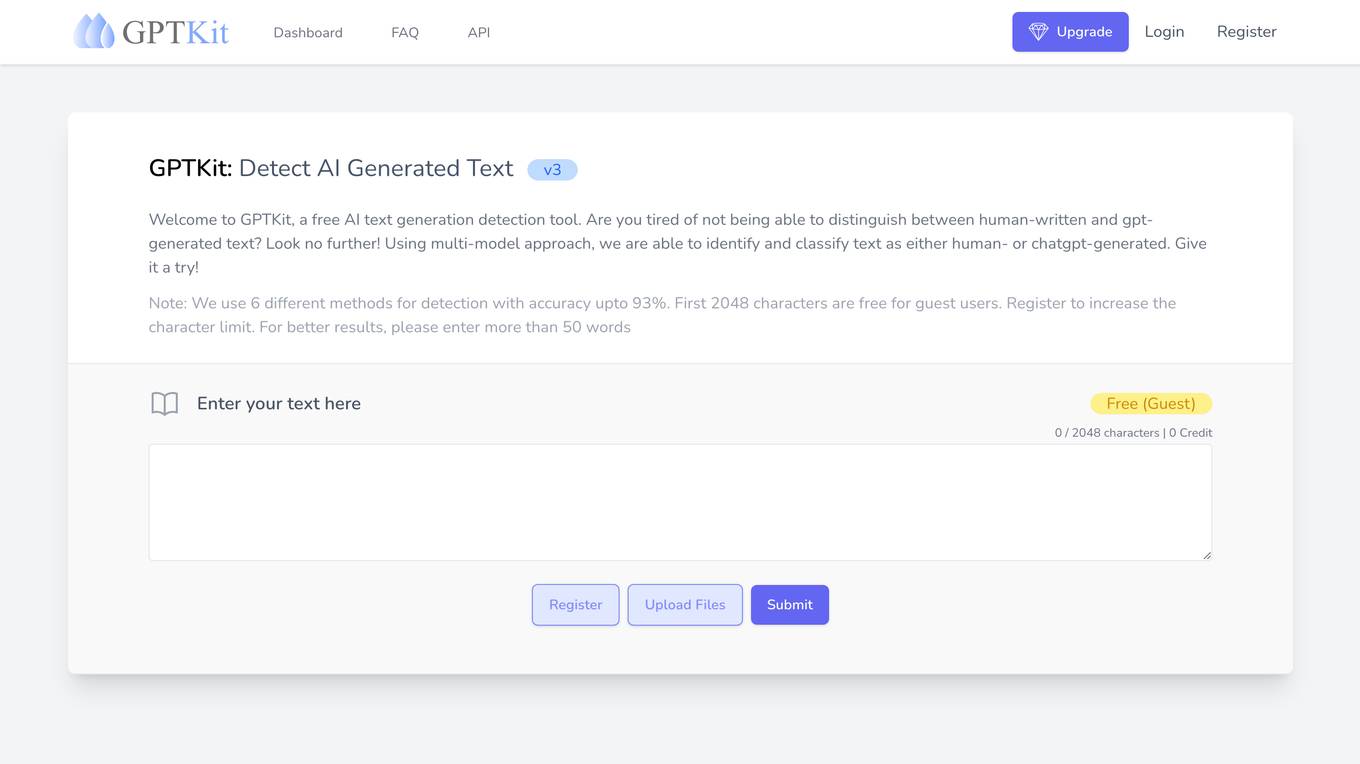
GPTKit
GPTKit is a free AI text generation detection tool that utilizes six different AI-based content detection techniques to identify and classify text as either human- or AI-generated. It provides reports on the authenticity and reality of the analyzed content, with an accuracy of approximately 93%. The first 2048 characters in every request are free, and users can register for free to get 2048 characters/request.
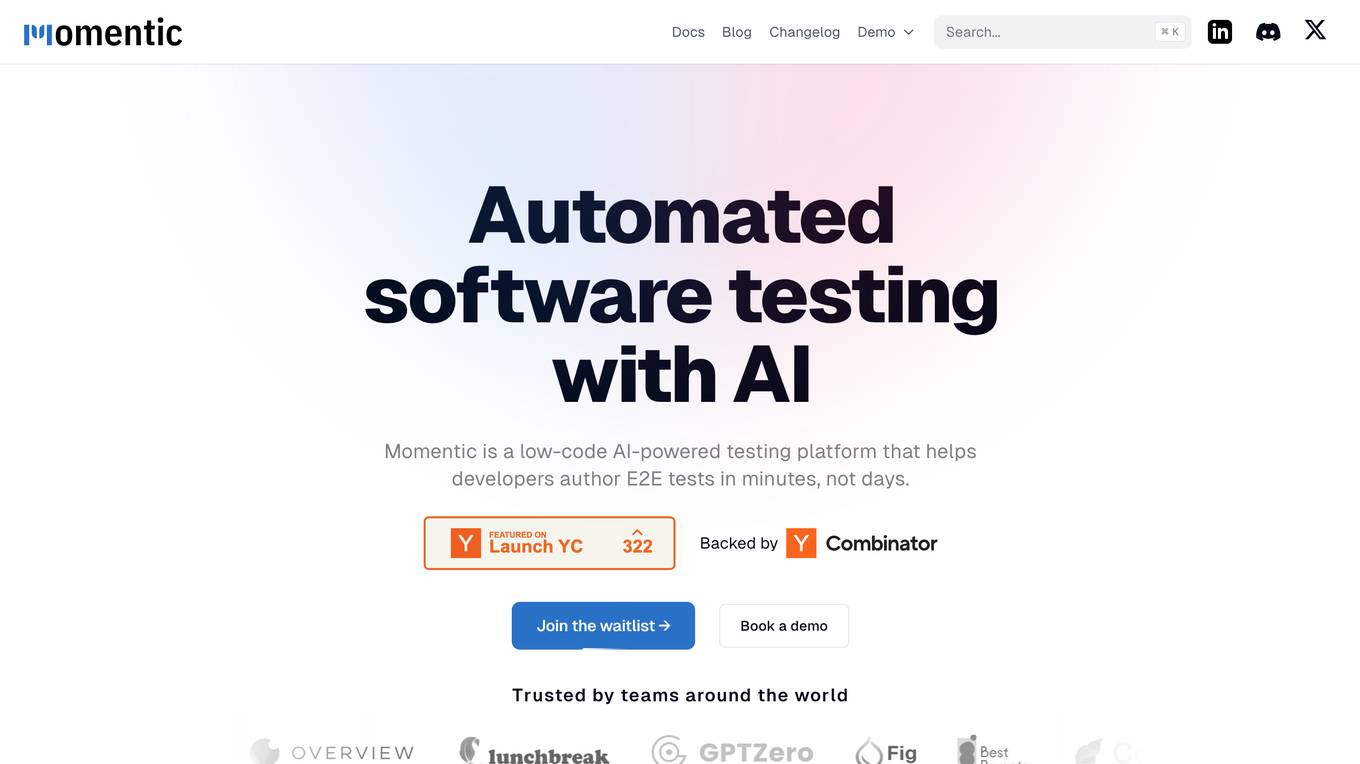
Momentic
Momentic is a purpose-built AI tool for modern software testing, offering automation for E2E, UI, API, and accessibility testing. It leverages AI to streamline testing processes, from element identification to test generation, helping users shorten development cycles and enhance productivity. With an intuitive editor and the ability to describe elements in plain English, Momentic simplifies test creation and execution. It supports local testing without the need for a public URL, smart waiting for in-flight requests, and integration with CI/CD pipelines. Momentic is trusted by numerous companies for its efficiency in writing and maintaining end-to-end tests.
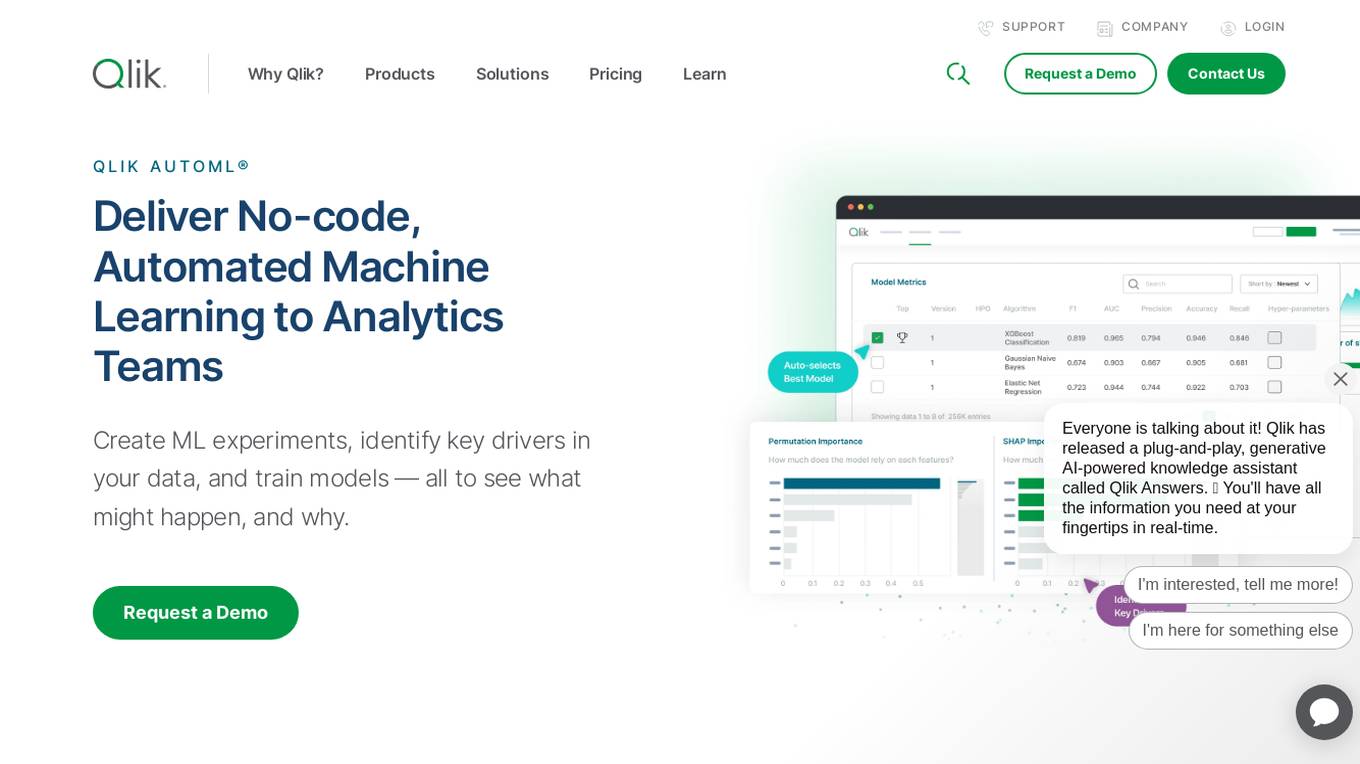
Qlik AutoML
Qlik AutoML is an AI tool that offers automated machine learning for analytics teams. It allows users to create machine learning experiments, identify key drivers in data, train models, and make predictions. With a focus on no-code machine learning, Qlik AutoML simplifies the process of generating predictive models and understanding outcomes. The tool enables users to explore predictive data, test what-if scenarios, and leverage AI-powered connectors for seamless integration with other AI and machine learning tools.
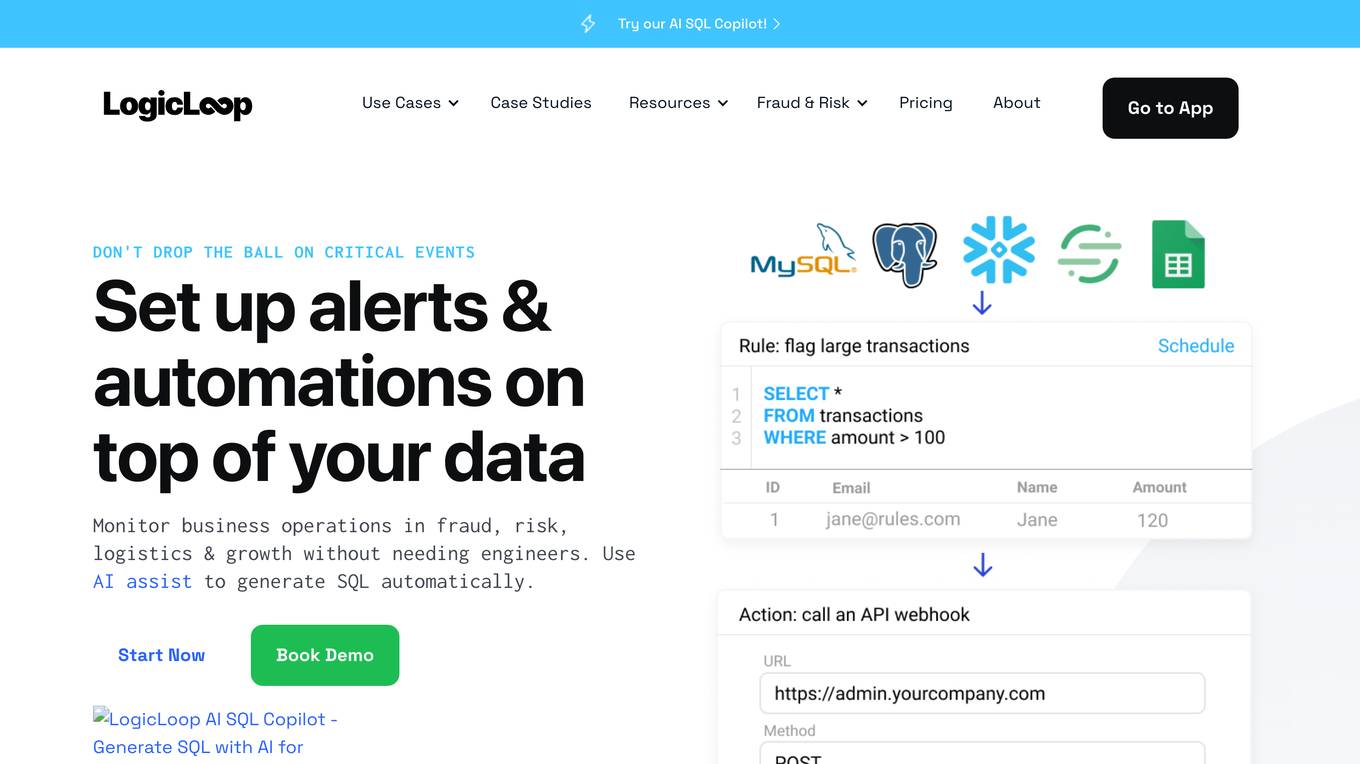
LogicLoop
LogicLoop is an all-in-one operations automation platform that allows users to set up alerts and automations on top of their data. It is designed to help businesses monitor their operations, identify risks, and take action to prevent problems. LogicLoop can be used by businesses of all sizes and industries, and it is particularly well-suited for businesses that are looking to improve their efficiency and reduce their risk.
1 - Open Source AI Tools
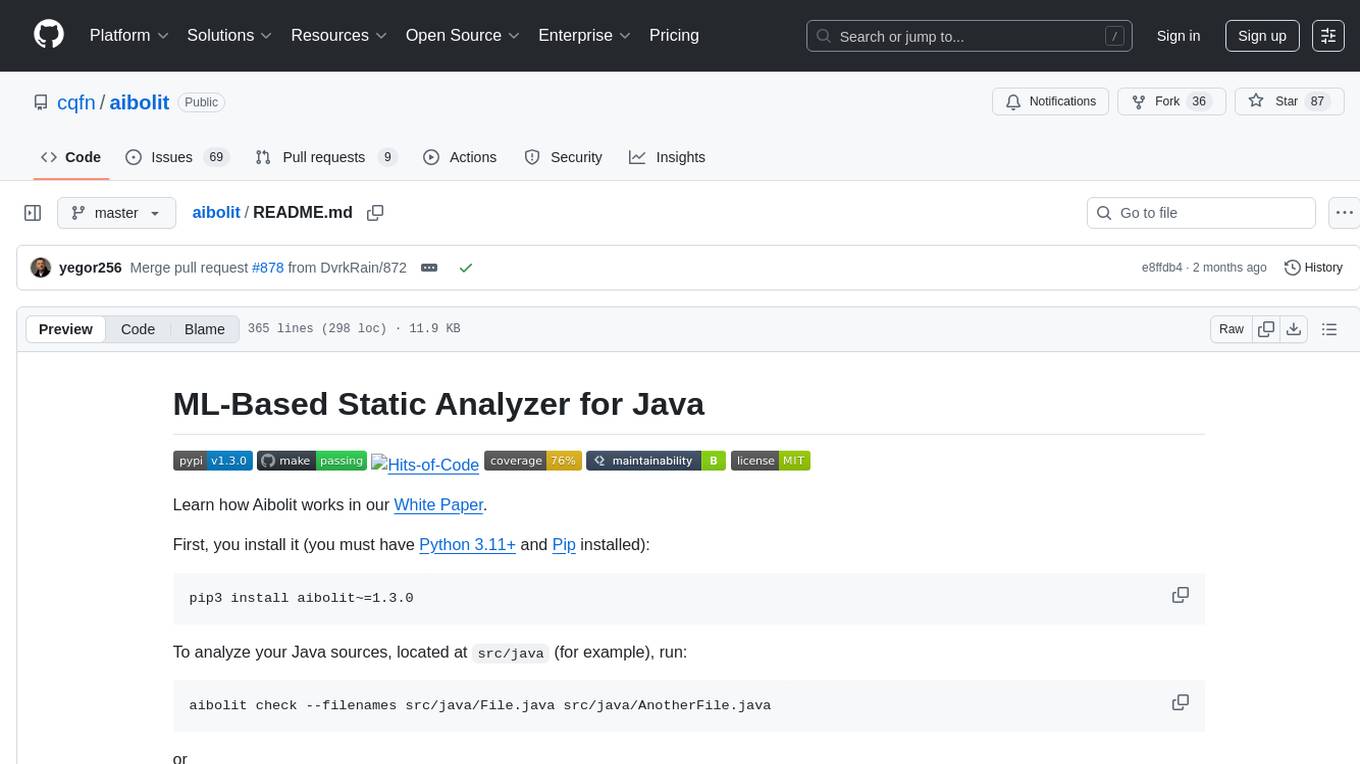
aibolit
Aibolit is a machine learning-based static analyzer for Java that helps identify patterns contributing to Cyclomatic Complexity in Java source code. It provides recommendations for fixing identified issues and allows users to suppress certain patterns. Aibolit can analyze individual Java files or entire folders of Java source code. Users can customize the output format and exclude specific files from analysis. The tool also supports training custom models for analyzing Java code. Aibolit is designed to help developers improve code quality and maintainability by identifying and addressing potential issues in Java code.
20 - OpenAI Gpts
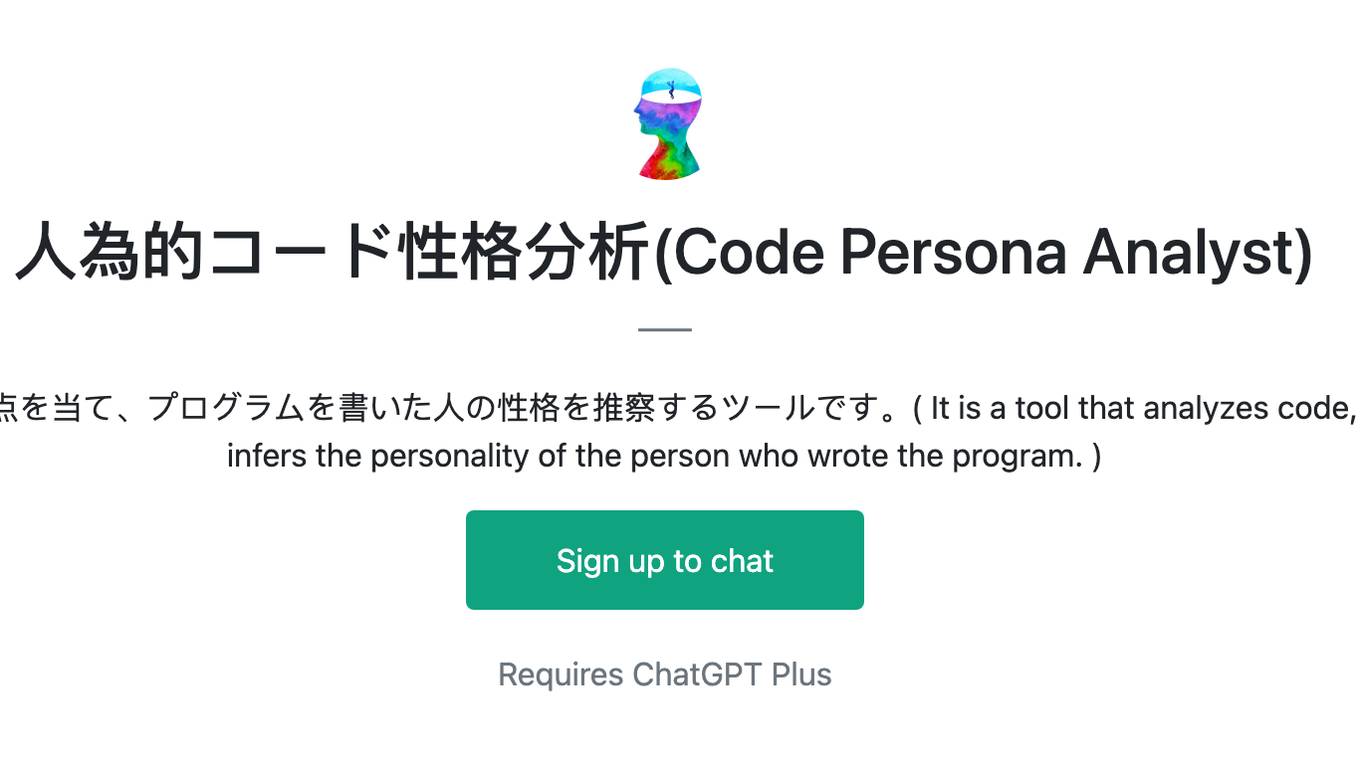
人為的コード性格分析(Code Persona Analyst)
コードを分析し、言語ではなくスタイルに焦点を当て、プログラムを書いた人の性格を推察するツールです。( It is a tool that analyzes code, focuses on style rather than language, and infers the personality of the person who wrote the program. )
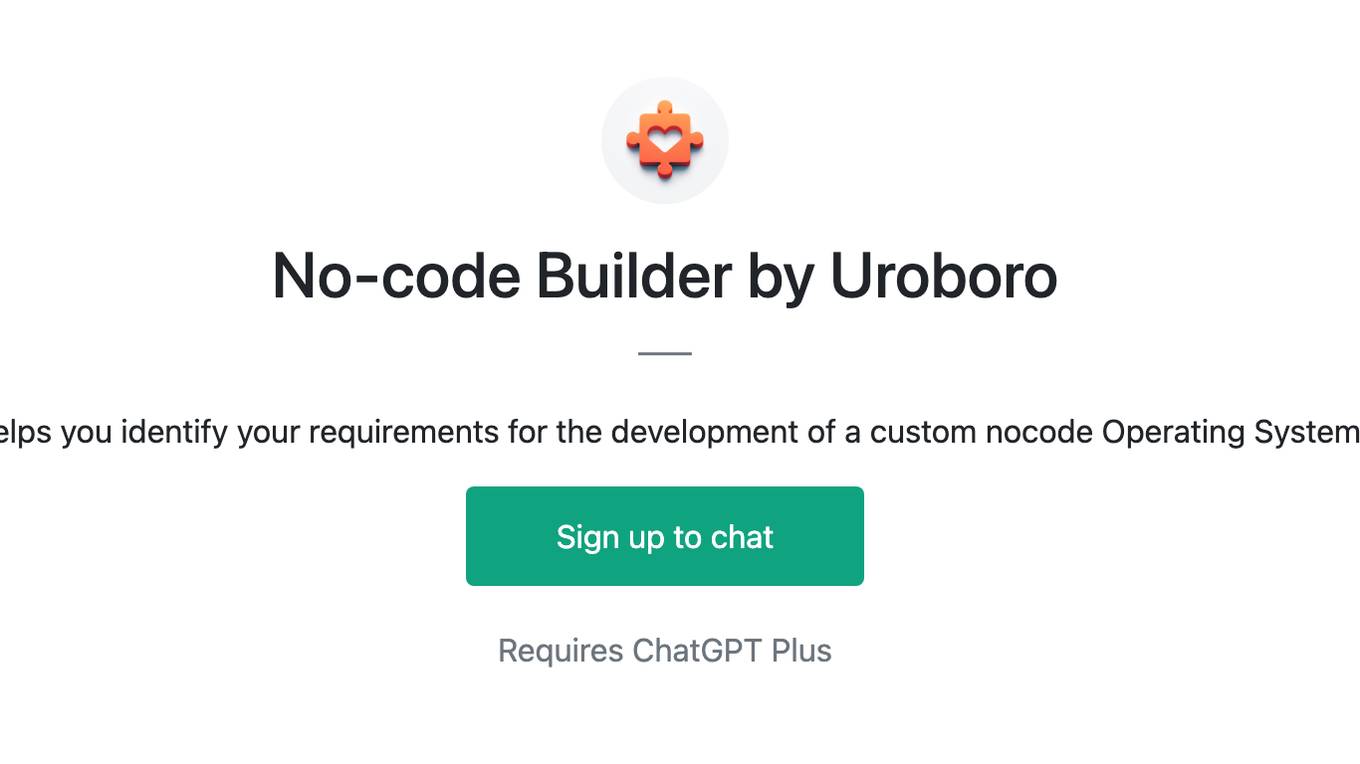
No-code Builder by Uroboro
Helps you identify your requirements for the development of a custom nocode Operating System
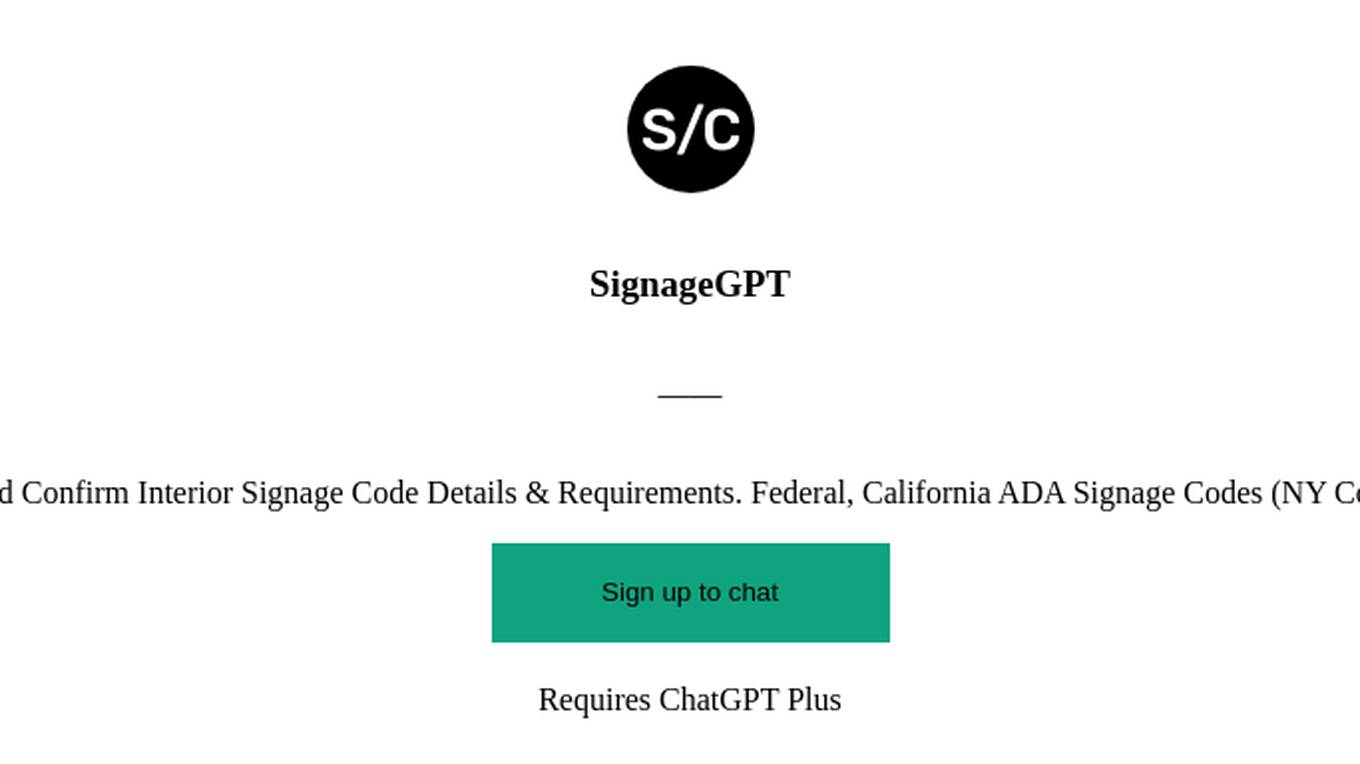
SignageGPT
Identify and Confirm Interior Signage Code Details & Requirements. Federal, California ADA Signage Codes (NY Coming Soon)

Dr. Keith's Code Accessibility Helper
Analyzes code for accessibility issues & provides recommendations
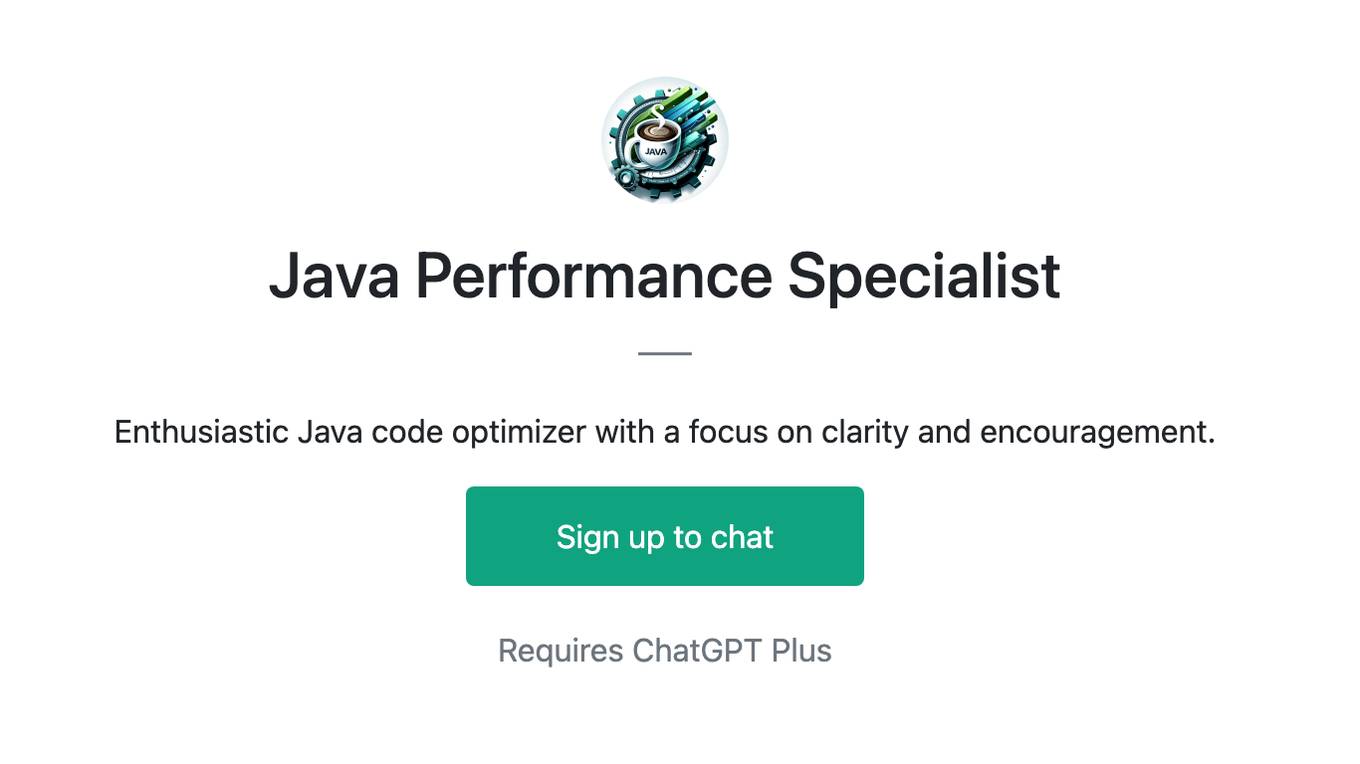
Java Performance Specialist
Enthusiastic Java code optimizer with a focus on clarity and encouragement.

🛡️ CodeGuardian Pro+ 🛡️
Your AI-powered sentinel for code! Scans for vulnerabilities, offers security tips, and educates on best practices in cybersecurity. 🔍🔐
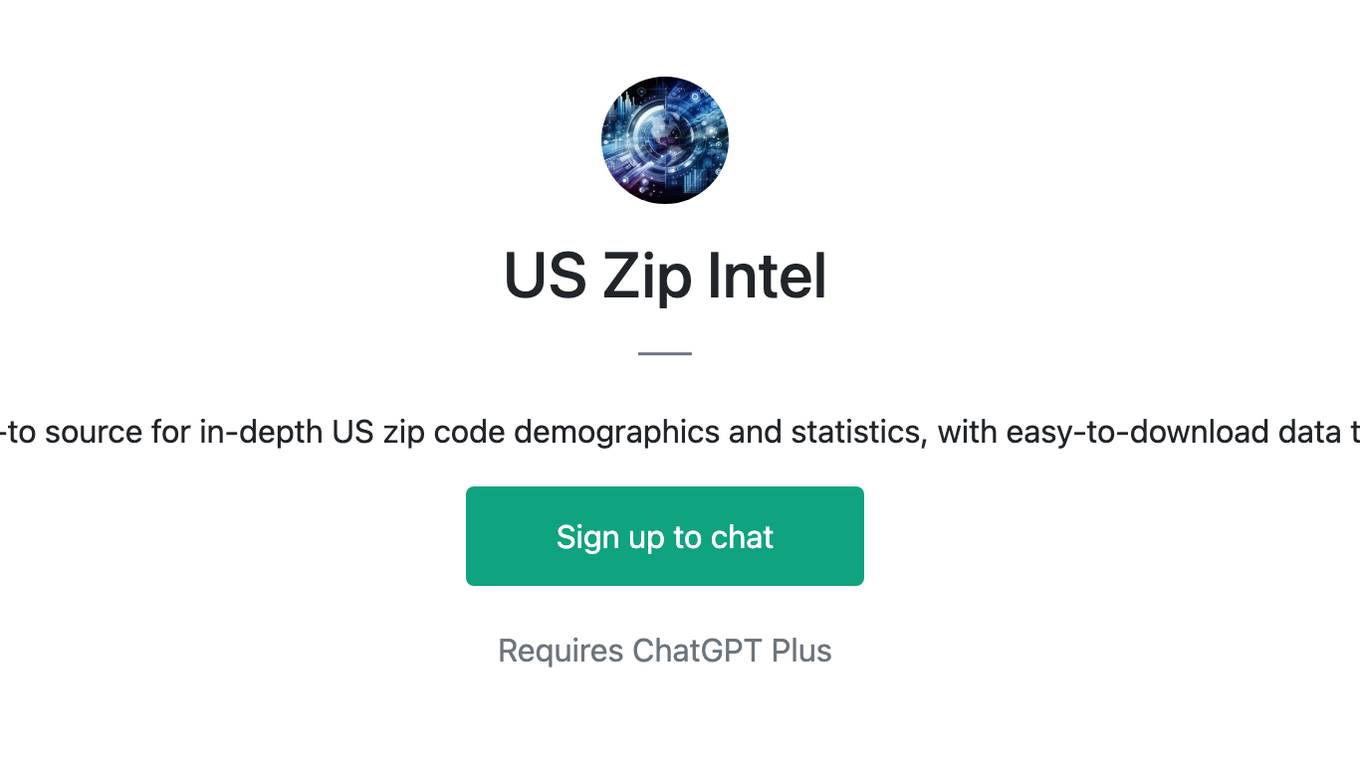
US Zip Intel
Your go-to source for in-depth US zip code demographics and statistics, with easy-to-download data tables.

Compliance Assistant
Helps UK firms align marketing content with the FCA's financial promotion rules and the CAP Code 📋
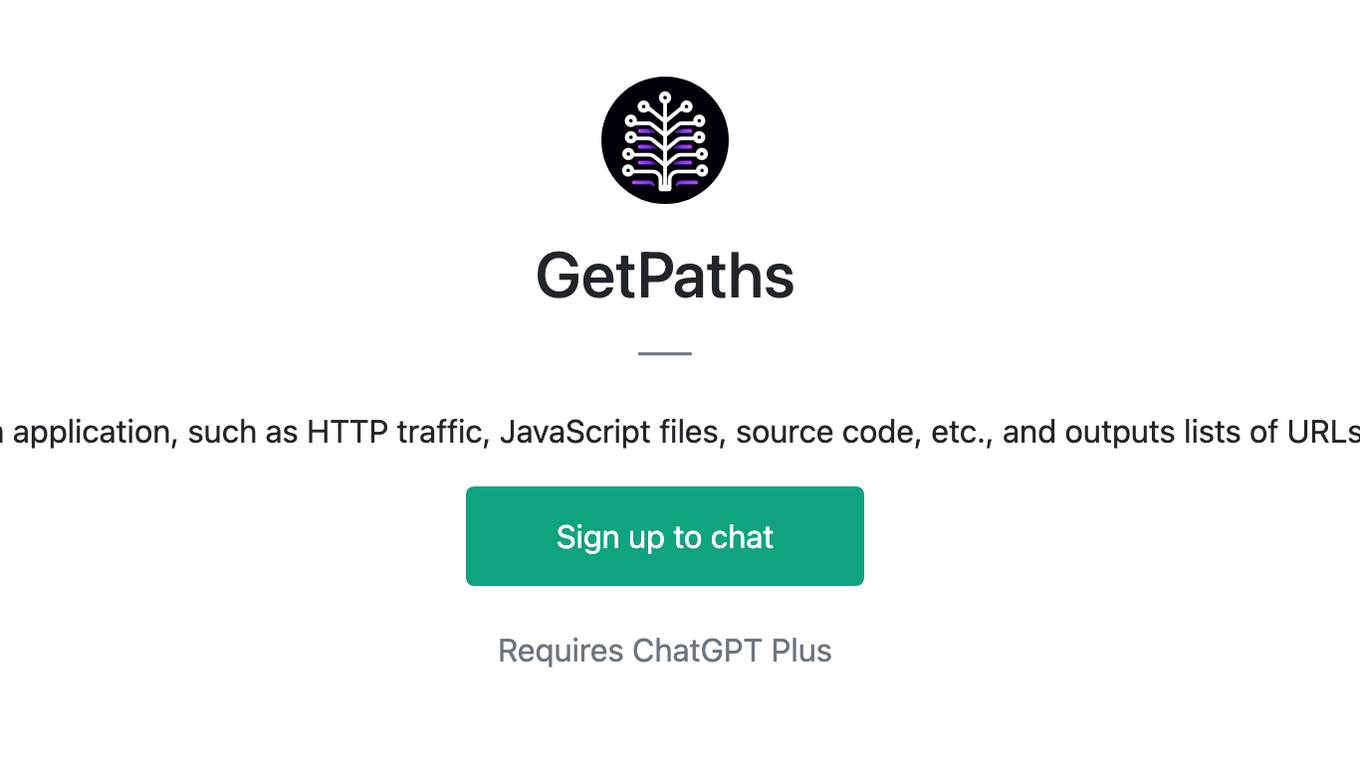
GetPaths
This GPT takes in content related to an application, such as HTTP traffic, JavaScript files, source code, etc., and outputs lists of URLs that can be used for further testing.
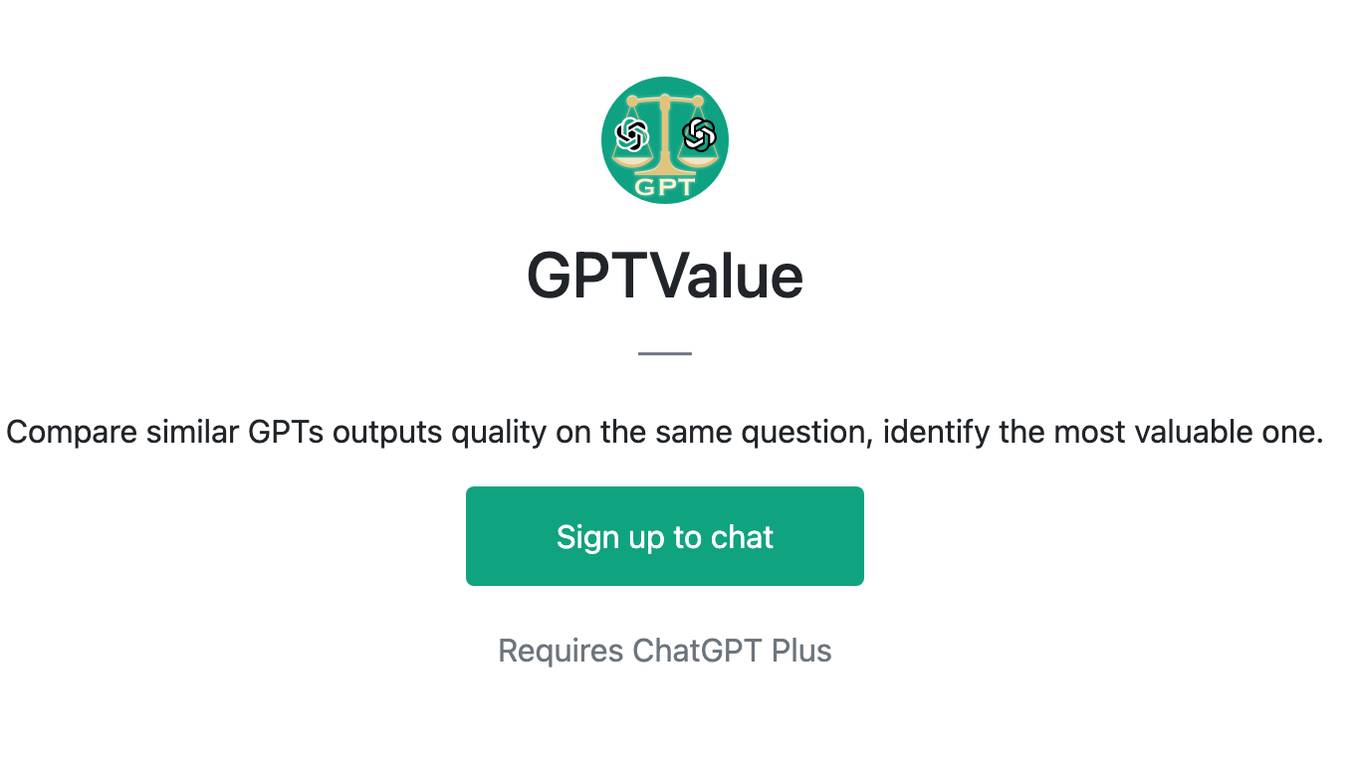
GPTValue
Compare similar GPTs outputs quality on the same question, identify the most valuable one.
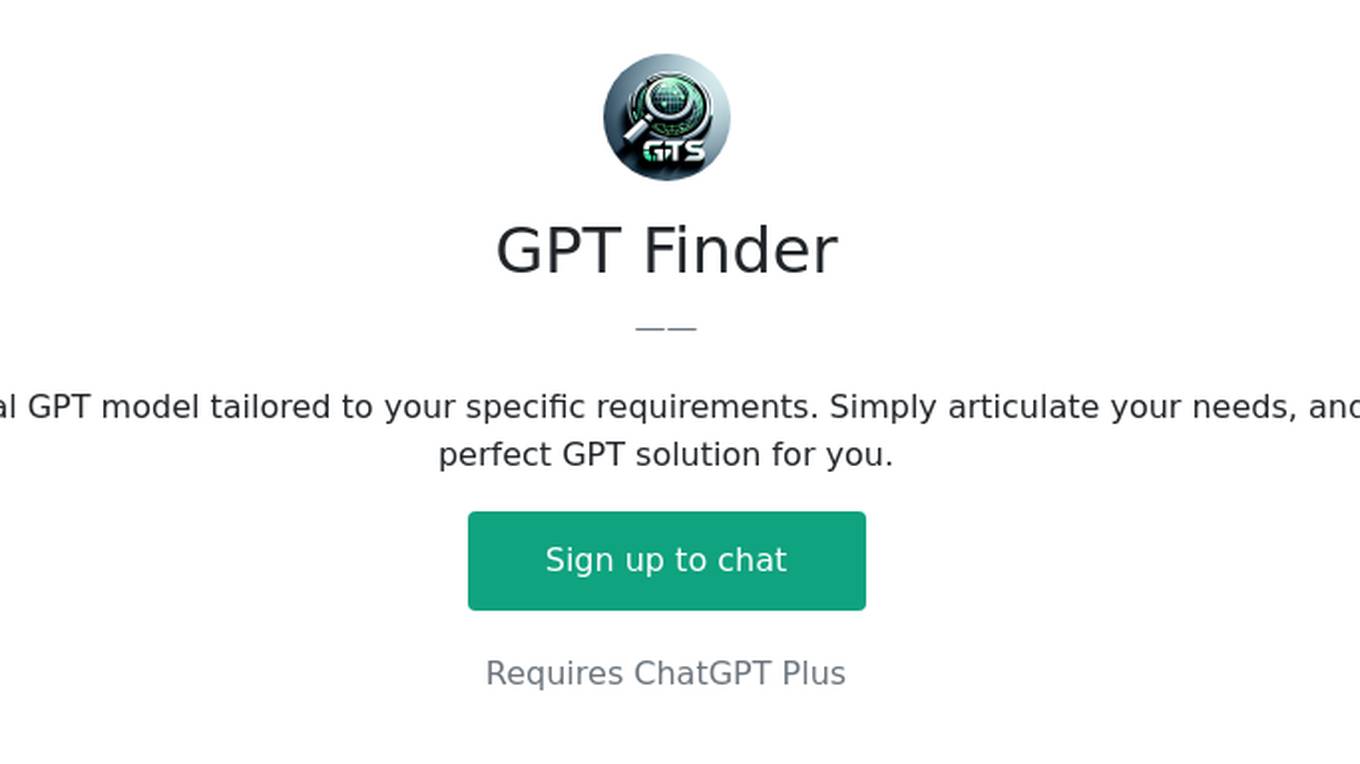
GPT Finder
This tool is designed to locate the ideal GPT model tailored to your specific requirements. Simply articulate your needs, and it will diligently work to identify the perfect GPT solution for you.
